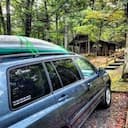Origins and Temperament
With roots tracing back to the Caucasus mountain region, the Caucasian Shepherd Dog is a guardian breed known for its bravery and loyalty. Bred to protect flocks from predators, these dogs exhibit a calm yet vigilantly protective temperament. Their size and protective nature mean they often require a calm, assertive handler and may need extra assurance and careful management when traveling to maintain a stress-free environment.
Size and Physical Needs
Known for their impressive size, Caucasian Shepherd Dogs can weigh anywhere from 80 to 200 pounds and require ample space to be comfortable. When considering transportation for such a large breed, it is essential to ensure they have enough room to stand up, turn around, and lie down comfortably. They need regular exercise, which must be managed even during transit, along with space that accommodates their thick fur and helps prevent overheating.
Common Health Considerations
While robust, Caucasian Shepherd Dogs can be prone to hip dysplasia, heart issues, and other conditions typical of large breeds. Ensuring they're up to date with all vaccinations and health checks is crucial, and any travel should accommodate their need for a comfortable, supportive surface to rest upon. Reliable health documentation is vital for both peace of mind and adherence to regulations.
















